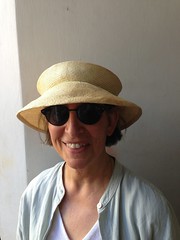
I'm a writer, publishing both as SJ Rozan and, with Carlos Dews, as Sam Cabot. (I'm Sam, he's Cabot.) Here you can find links to my almost-daily blog posts, including the Saturday haiku I've been doing for years. BUT the blog itself has moved to my website. If you go on over there you can subscribe and you'll never miss a post. (Miss a post! A scary thought!) Also, I'll be teaching a writing workshop in Italy this summer -- come join us!
Read/Post Comments (6)

Zayde and the Chinese shoes
My new book, THE SHANGHAI MOON, coming out in Feb., is partly set in the Jewish ghetto in Shanghai during WWII. The where? you ask. More about that in coming days and weeks, including a contest and all sorts of stuff; but right now, what I wanted to say is, I have a great interest in the Jewish-Chinese connection. I'll be posting stories about that connection over the next few months, too. But this is the first, it's one of my favorites, and I only just heard it last week at my uncle's funeral.
(Note: Jules, hwh, Yoey, or any other (possibly lurking) relatives who remember this differently, please jump in and correct me!)
Zayde, my grandfather, was in the shoe business. The family lived in Boston and he had a factory in New Hampshire, where many shoe factories were concentrated. All during the Depression, their family did okay. Not wealthy, but not poor like so many people. They stayed solidly middle class and solvent, ate well, had a car. And the shoe factory never closed, and apparently never missed a payroll.
I knew all this, but it didn't occur to me to wonder how it happened that my Zayde's shoe business kept going while so many factories closed. Well, it seems part of the reason was the Chinese shoes.
Zayde was what was then called an Orthodox Jew. These days I'd probably call him "observant" (he wore a yarmulke to synagogue, but not in his daily life, etc.) but he was religious and they kept a kosher home. Orthodox Jews, like every other close-knit group, had their own lines of communication, and though back then long-distance communication was generally by letter and telegram, somehow Zayde learned that the Chinese communities in the Chinatowns of Los Angeles and San Francisco were having trouble finding cheap shoes. It seems Sears and the other retailers where you could get shoes for $1.99 didn't stock sizes small enough for the Chinese. So Zayde raced across the country, which in those days involved a three- or four- day train ride, a nice relaxing slow cross-country race. He met with retailers, probably Jewish and Chinese dry goods store owners, and asked what their Chinese customers needed. Then he raced back to Nashua, New Hampshire, and produced samples, which he shipped back across the country.
Success! The Chinese customers loved them. And even at the low cost -- what we would call today, the price point -- the shoes, because they were so small, were made from so much less material than other shoes the factory produced that he was able to ship them across the country and still make money. So it turns out this particular Jewish-Chinese connection is part of the reason my mother's family stayed comfortable all through the Great Depression.
(Note: Jules, hwh, Yoey, or any other (possibly lurking) relatives who remember this differently, please jump in and correct me!)
Zayde, my grandfather, was in the shoe business. The family lived in Boston and he had a factory in New Hampshire, where many shoe factories were concentrated. All during the Depression, their family did okay. Not wealthy, but not poor like so many people. They stayed solidly middle class and solvent, ate well, had a car. And the shoe factory never closed, and apparently never missed a payroll.
I knew all this, but it didn't occur to me to wonder how it happened that my Zayde's shoe business kept going while so many factories closed. Well, it seems part of the reason was the Chinese shoes.
Zayde was what was then called an Orthodox Jew. These days I'd probably call him "observant" (he wore a yarmulke to synagogue, but not in his daily life, etc.) but he was religious and they kept a kosher home. Orthodox Jews, like every other close-knit group, had their own lines of communication, and though back then long-distance communication was generally by letter and telegram, somehow Zayde learned that the Chinese communities in the Chinatowns of Los Angeles and San Francisco were having trouble finding cheap shoes. It seems Sears and the other retailers where you could get shoes for $1.99 didn't stock sizes small enough for the Chinese. So Zayde raced across the country, which in those days involved a three- or four- day train ride, a nice relaxing slow cross-country race. He met with retailers, probably Jewish and Chinese dry goods store owners, and asked what their Chinese customers needed. Then he raced back to Nashua, New Hampshire, and produced samples, which he shipped back across the country.
Success! The Chinese customers loved them. And even at the low cost -- what we would call today, the price point -- the shoes, because they were so small, were made from so much less material than other shoes the factory produced that he was able to ship them across the country and still make money. So it turns out this particular Jewish-Chinese connection is part of the reason my mother's family stayed comfortable all through the Great Depression.
Read/Post Comments (6)
Previous Entry :: Next Entry
Back to Top